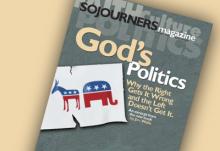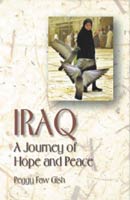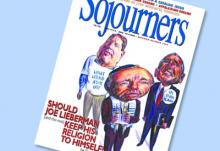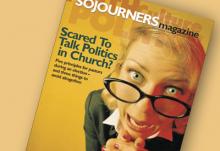Politics

Hurricane Katrina opened the eyes of many to the reality of poverty in America. Will we take responsibility for the poor in our land of plenty?
Catholic reform movement Call To Action - a national 25,000-member group of laity, religious, and clergy-is challenging U.S.

Why can't personal ethics and social justice - together - become a real political choice?
 A Peace Diary
A Peace Diary
Longtime peace advocate Peggy Gish traveled to Iraq, along with others in the Christian Peacemaker Teams, to do what she does best: get in the way. Iraq: A Journey of Hope and Peace is her story of their work before, during, and after the U.S. invasion. Told in the first-person, Gish recounts her efforts to create relationships with Iraqis, fight for justice, and seek peace. Herald Press.
There is probably no more divisive time in America than an election season. So I thought it appropriate to tell a personal story of reconciliation that is very important to me, and one that I have never told before.

When candidates claim God as their campaign manager, you can be sure they're trying to divert attention from the real question: Do they walk the talk?
Ive been "checking in" with Sojourners off and on for a number of years. I appreciate and strongly support your commitment to Christian discipleship in every aspect of life.
Advocates of campaign finance reform approach the issue from two different strategic perspectives: Abolitionism and incrementalism. Abolitionists espouse comprehensive reform - full public financing that removes all private money from the electoral process. They see money in politics as a raging river - dam it at one point and it will create a new riverbed elsewhere. Under the name of the Clean Money, Clean Elections (CMCE) reform, public financing is successful law to varying degrees in four states.
A federal "clean elections" bill has been introduced that, like the state bills, gives public financing to qualified candidates who agree not to take campaign contributions from private sources (except for a limited number of small "qualifying" contributions that serve to establish eligibility for the full public stipend). Right now, the federal bill lacks the grassroots support to make it a pressing issue.
The difficulty of passing a comprehensive public financing bill is why many reformers choose the incremental approach. On the assumption that it is better to pass a limited bill than no bill at all, they hope to reform the system in stages. The 2002 McCain-Feingold bill (officially known as the Bipartisan Campaign Reform Act or BCRA), is their primary accomplishment. It is meant to prohibit "soft money," the hundreds of millions of dollars that corporations, labor unions, and wealthy individuals launder through unregulated state parties for use in federal elections.
Many abolitionists predicted that McCain-Feingold would prove to be one big loophole that would spawn new conduits for soft money and dilute efforts to build popular support for comprehensive public financing.
President-elect George W. Bush, as a victor who lost the popular vote and won the presidency with a 5-4 Supreme Court decision, will face a divided nation
In the Old Testament lesson at my church one Sunday, we read, "Pray for the peace of Jerusalem...

The real question is not whether religious values should help shape politics, but how.
